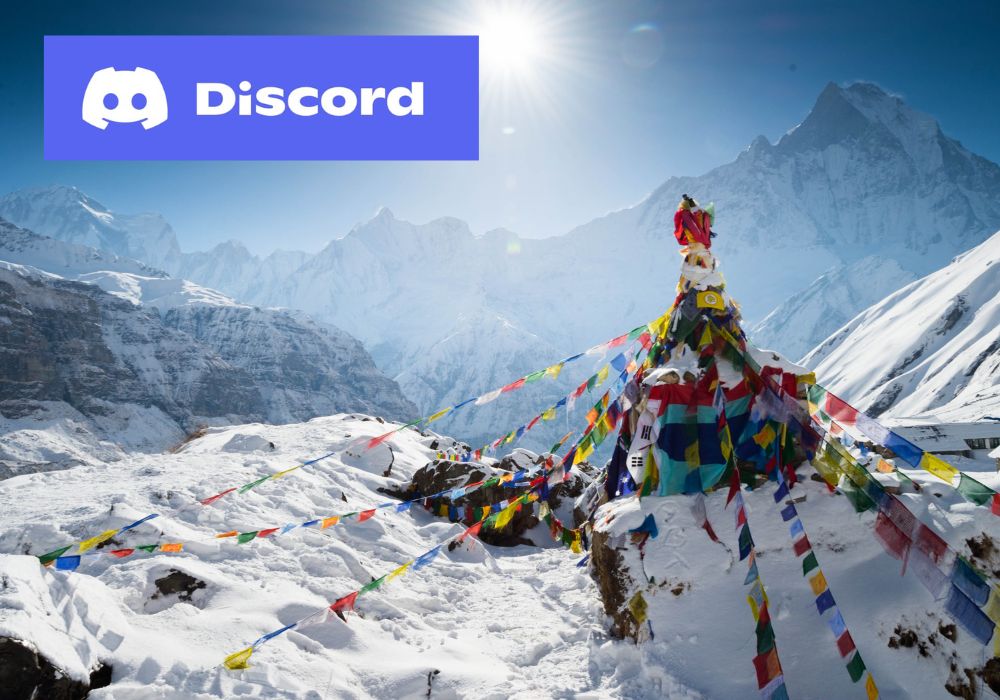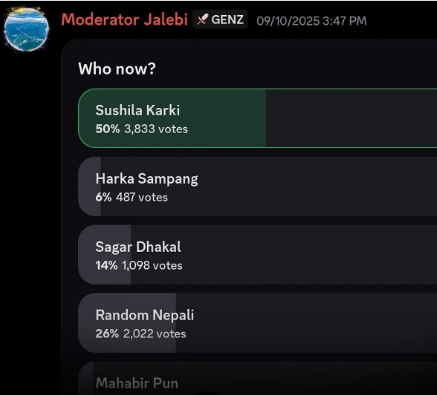
In September 2025, Nepal witnessed a startling political turn: youth-led protests, powered largely by Gen Z, toppled the government of Prime Minister K.P. Sharma Oli. What followed was not ordinary political negotiation behind closed doors, but rather, a virtual, decentralized process led in part by Discord, a platform best known for gaming and casual community chat. Using Discord, protestors held informal polls and discussions that helped select former Chief Justice Sushila Karki as the interim Prime Minister as traditional political fault lines cracked under demands for integrity, accountability, and change.

Just to clarify, Random Nepali is a famous Nepali Youtuber.
This development is remarkable not just for its symbolic value, but for what it reveals about how power, governance, and civic engagement can be re-imagined in the digital era. For anyone in the crypto community, there are lessons here: systems that reduce intermediaries, enhance transparency, and allow direct participation can reshape established institutions and expectations. Hotcoin Insider examines how Nepal’s Discord election offers a window into what “governance without intermediaries” might look like, and why this matters for the world.
What Happened in Nepal
Key actors in Nepal’s recent story were young activists, united under the banner of Hami Nepal, who used platforms like Discord and Instagram to organize, deliberate, and mobilize. Discontent had long been brewing over corruption, nepotism, abuse of power, and restrictions on free expression (notably a ban on several social media apps). When protests erupted, these digital tools became vital for coordination.
On Discord, thousands of protestors and community organizers engaged in debates, shared opinions, and eventually held polls to select from among potential interim leaders. Over time, Sushila Karki, former Chief Justice known for her anti-corruption rulings, emerged as the favored candidate. The consensus built through this digital crowd was then validated by discussions involving the President and military leadership, dissolving parliament and installing Karki as interim PM until elections scheduled for March 5, 2026.
The Governance Lessons for Crypto and Beyond
This episode in Nepal underscores several themes with clear relevance to crypto ecosystems, DAOs, and any organization seeking smoother, more democratic governance.
- Direct Participation Over Hierarchy
Traditional democracies often rely on representative structures, intermediaries, bureaucracies. Nepal’s Discord process allowed many voices from the ground up, to shape leadership decisions. This is akin to DAO proposals and votes: stakeholders engage directly, without layers of gatekeeping. - Transparency & Public Deliberation
What distinguishes Discord-led discussion is openness: people could see arguments, compare candidates, critique positions, and participate in polls. In crypto, transparency and public accountability are central: smart contracts, open-source code, public governance forums. Nepal’s process echoes that ideal. - Rapid Feedback & Flexibility
When trust in institutions erodes, the ability to pivot quickly matters. In Nepal, Discord enabled fast assemblies of shared opinion; when corruption scandal or political missteps occurred, people didn’t wait for traditional political elites. Crypto systems reward similar agility: fast votes, snapshot polls, nimble governance mechanisms. - Empowering the Marginalized & Disaffected
Gen Z in Nepal felt shut out by existing power structures: political nepotism, elite dominance. By turning to a digital platform they already use, this generation made itself heard. In crypto, inclusivity (token holders, small stakeholders) matters. Giving voice to those previously excluded strengthens legitimacy. - Minimizing Gatekeepers
In many political systems, intermediaries (party bosses, legislative committees, bureaucrats) can block change. Discord effectively bypassed many of these middle layers. Crypto’s promise is similar: protocols which enforce rules without intermediaries, giving users more sovereignty.
Risks and Challenges
Of course, Nepal’s “governance via Discord” is not without risks and open questions:
- Legitimacy and Constitutionality: Informal polls are different from constitutional, legal processes. Nepal’s process still required signatures from President, Army, and legal justification. Issues may arise around legal precedents.
- Security, Misinformation & Manipulation: Digital platforms can suffer from fake accounts, spam, disinformation, or voting manipulation. Ensuring integrity is not trivial.
- Representation Bias: People with internet access and digital literacy are overrepresented. Many rural or marginalized populations may not have equal participation.
- Sustainability: Does this mode of temporary crisis governance scale to long-term policy making? Once urgency wanes, do old power structures return?
Why Crypto Needs to Watch This
At Hotcoin, we believe that decentralization is not just a technical ideal but a governance imperative. Nepal’s recent turn shows that when people feel disconnected from existing power structures, they will build their own. Digital, grassroots mechanisms can challenge stagnation, corruption, and leave legacy systems in crisis. For crypto, this reinforces what many already know: governance must always include voices beyond incumbents. We must design systems that are transparent, auditable, participatory, and resilient. Tools like on-chain voting, decentralized identity, DAOs, trustless governance, all these are part of a movement that reflects what Nepal just did using Discord.
Looking Forward
Nepal’s interim PM Sushila Karki steps into a difficult role: restoring order, preparing for elections, addressing demands for justice, reparations, and transparency. Whether this digital-led movement translates into lasting institutional change remains to be seen. But what is clear is that:
- The means of political participation are evolving.
- Younger generations are insisting on real agency, not just token representation.
- Platforms originally built for entertainment or gaming can become tools of political empowerment.
Nepal’s recent experiment of using Discord polls and open debates to help choose its interim leadership is more than political drama; it is a beacon for how governance might evolve in the 21st century.
Hotcoin Official Site: https://www.hotcoin.com
Hotcoin Twitter: https://x.com/HotcoinGlobal
Hotcoin Telegram: https://t.me/HotcoinEX
Hotcoin Chinese Twitter: https://x.com/hotcoinzh
Hotcoin Chinese Community: https://t.me/hotcoinglobalcn
Hotcoin YouTube: https://www.youtube.com/@hotcoinglobal
